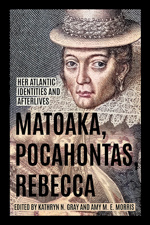Today, we are happy to bring you our conversation with Kathryn N. Gray and Amy M. E. Morris, editors of Matoaka, Pocahontas, Rebecca: Her Atlantic Identities and Afterlives
What inspired you to write this book?
Pocahontas is someone we both know and don’t know. She is part of the historical record, but she is a silent presence in the colonial archive. By delving into a variety of print and manuscript sources, Indigenous heritage, visual and material culture, in addition to contemporary art and poetry, we retrace the identities and roles of Matoaka/Pocahontas. To do her story justice, the book had to be interdisciplinary, so we worked with a team of inspiring scholars, who brought their own perspectives and methodologies. We chose a transhistorical approach and invited some unusual essay formats, to show how the work of rediscovery enables us to reimagine and reshape our relationship with the past.
What did you learn and what are you hoping readers will learn from your book?
Putting this book together was an intellectual adventure. Our contributors challenged us to learn from their different approaches as they led us through the archive and into their interpretive choices. Readers will encounter a host of fascinating facts and ideas about Pocahontas in her different contexts –as the daughter of Chief Powhatan, as the Jamestown captive and convert who took the baptismal name ‘Rebecca’, and as Lady Rolfe, a traveller to James I’s London. One advantage of an essay collection is that it can accommodate the divergences and debates that make writing about Pocahontas difficult. We learned that fractures and frictions express the history and legacy of colonisation, and we were inspired by Sarah Sense’s weaving practices, to aim in our editorial task for recombination rather than resolution.
What surprised you the most in the process of writing your book?
Pocahontas is often regarded as a singular individual – unique, special. In some ways this is true. In other ways it’s not. The volume’s chapters connect Pocahontas to different communities -- to other Indigenous travellers to England in the early modern period, other Indigenous sitters whose portraits were produced in the 17th and 18th centuries, other captives, male and female, and contemporary Indigenous writers including Karenne Wood, to whom our book is dedicated. One of the welcome surprises of the book is that it places Pocahontas in so many contexts and shows her in relation to different cultures, people, and experiences. The historical and reimagined Pocahontas who emerges from our volume is not defined by her difference or lonely isolation but moves instead within a network of connections, traditions and inheritances.
What’s your favorite anecdote from your book?
This anecdote is about rather than from the book. We had a shock when the press showed us the cover design. We had recommended that the De Passe engraving, which is the only visual image of Matoaka/Pocahontas from her lifetime, not be used on the jacket. We were concerned about its over-familiarity and that it risked commodifying or fixing her in a European frame (as Monique Mojica brilliantly satirizes in Pocahontas and the Blue Spots). But in the end we loved the jacket designers’ beautiful recreation of the engraved image. It expressed our goal to shed invigorating new light on the historical figure. We were aiming to use the bold outlines of the printed archive but also to see through and beyond them, and to work respectfully of Pocahontas’s agency and silent subjectivity.
What’s next?
For the contributors to the collection, what’s next will be more cutting edge historical and anthropological scholarship on Indigenous and colonial America. From the artists, we can expect new, challenging, and extraordinary artworks. As for the editors, we look forward to future collaborative projects that continue the process of opening up the archive in surprising, innovative and interdisciplinary ways. Watch this space!





